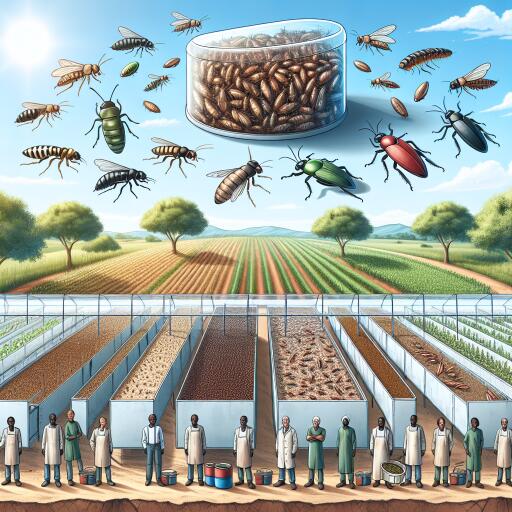World Bank Advocates for Insect Farming in Africa to Combat Food Security Crisis
In a bold move to combat food insecurity and malnutrition across Africa, the World Bank has placed a spotlight on insect farming as a viable solution. In a continent battling an escalating food crisis, the introduction of insect farming could not only provide a new food source but also offer a multi-billion-dollar market opportunity.
Dr. Dorte Verner, the World Bank’s Chief Agricultural Economist for Africa, addressed the urgent need for a paradigm shift in agricultural practices. With only 850 insect farmers scattered across 16 African countries and a mere 17 in Kenya, the potential for growth is immense. The practice, poised to burgeon into an industry worth approximately US $8 billion by 2030, offers more than just increased food production. It represents an opportunity for economic growth, job creation, nutritional enhancement, and agricultural diversification.
At the forefront of this initiative, the Jomo Kenyatta University of Agriculture and Technology (JKUAT) hosted the Insect for Green Economy conference, where Dr. Verner laid out the case for insect farming. Highlighting species such as black soldier flies, mealworms, crickets, and desert locusts, she illustrated the high demand for insect-blended food products and the appeal of rapid returns on investment. Farmers engaging in insect farming could see their initial capital returned in just 127 days, showcasing the economic viability of this endeavor.
The compelling argument for the switch to insect farming isn’t solely about economic gain. The process offers a sustainable, circular economy model—converting household waste into high-value products such as protein, fats, oils, and even fertilizer through the activity of farmed insects. Furthermore, the minimal land use requirements for insect farming present a solution to the dwindling availability of arable land, simultaneously addressing environmental sustainability concerns.
Dr. Verner underscored the potential for insect farming to generate as many as 15 million jobs in Africa, potentially satisfying three-quarters of the continent’s employment needs, both directly and indirectly. Teresia Karanja, the Deputy Director of the State Department of Agriculture, reaffirmed this stance, assuring government support for farmers willing to transition to insect farming through resources like inputs and market linkages.
The call to action does not go without acknowledging the challenges ahead. There is a significant need for research into mass breeding and improved rearing techniques. Karanja highlighted the critical role of technological advancements, like selective breeding, in overcoming these obstacles. Moreover, the importance of awareness campaigns cannot be overstated—targeting not only investors and farmers but also suppliers and consumers, educating them about the benefits and opportunities inherent in insect agriculture.
As Africa stands on the brink of a food security revolution, the world watches closely. The initiative by the World Bank to promote insect farming could mark the beginning of a significant transformation in how food and feed are produced on the continent, offering a beacon of hope against the looming threat of food insecurity and malnutrition.
